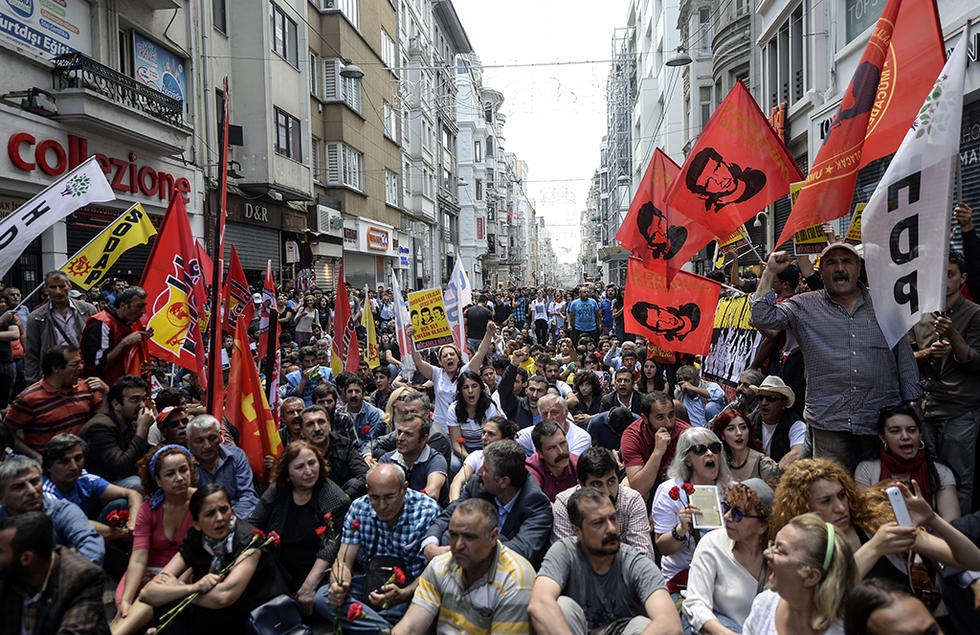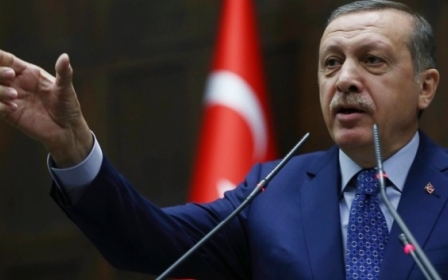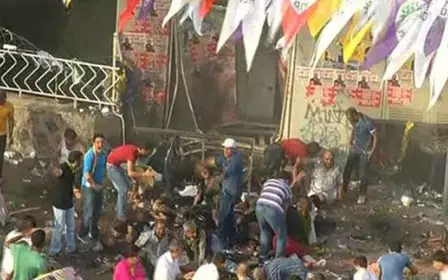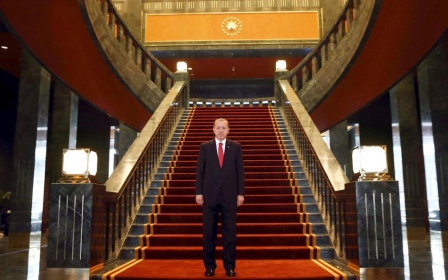As Turkey elections loom, the ghost of Gezi Park still lingers

As swathes of Turkey went up in flames, tensions over the bulldozing of one of Istanbul’s last green spaces bubbling over into protests against the Freedom and Justice Party’s (AKP) 13-year rule of the country, Turkey’s main TV channels, including MSNBC-affiliated NTV and CNN Turk, chose not to pay much attention - the latter choosing to instead broadcast a documentary about penguins.
For the groups involved in the demonstrations that swept Turkey from May to August 2013, the reaction of the media was typical of the reaction of the establishment to their varied desires and interests.
A decision by Istanbul authorities to close off Taksim Square on the anniversary of the demonstrations last week has further compounded suspicions that the government is keen not to once again spark off the tinderbox that brought millions out into the streets across Turkey, just prior to Sunday’s parliamentary elections.
While some Western observers were keen to draw comparisons with the Arab Spring, placing then-Prime Minister Recep Tayyip Erdogan in the same camp as Tunisia’s Ben Ali or Egypt’s Hosni Mubarak, others suggested that they were more akin to the Occupy Movement or the protests that rocked Brazil prior to the World Cup in 2014 - that is, mass demonstrations in ostensibly democratic societies against perceived government corruption, erosion of civil liberties and untrammelled free-market capitalism.
Erdem Yoruk and Murat Yuksel, writing in the New Left Review, produced an analysis of the socio-economic backgrounds of the protesters involved in the Gezi demonstrations, arguing - in contrast to other analyses - that the protests represented a wide spectrum of Turkish society.
They noted that a multitude of social movements had sprung up in Turkey in the preceding years, with an increase in trade union militancy over privatisation and declining wages, anger from Jewish, Christian and Alevi minorities at the AKP’s perceived sectarianism (such the decision to name a new Bosphorous bridge after Yavuz Suleyman, a sixteenth-century Ottoman sultan responsible for slaughtering over 40,000 Alevis) women’s and LGBT rights activists protesting the introduction of socially conservative policies and a failure of protection (including a dramatic increase in honour killings) and Kurds, Zazas and Arabs seeking greater recognition of their communities.
“Gezi would bring together these different groups on the basis of anti-government sentiment, mobilised, in the face of fierce state violence, around the most innocent of political demands: ‘Don’t demolish our city park’,” Yoruk and Yuksel wrote.
“The protests should be understood as a popular movement driven by political demands, in which all social classes participated proportionally. The demands were predominantly political and embraced all social classes.”
“As such, the main target was not capital and its owners, but the Erdogan government,” they concluded.
'Alienation'
The AKP’s rise to power in the early 00's has often been ascribed to its ability to generate enormous levels of growth in the economy, while providing generous social assistance programmes and investment in rural areas.
A report by the Organisation for Economic Development (OECD) released at the end of 2014 showed that inequality in Turkey had soared to the point that 10 percent of the population held 78 percent of the wealth.
Unemployment has also risen to 13 percent, comparatively low compared to neighbouring Greece, but markedly higher than the low of eight percent in 2014.
The deaths of over 300 people at a coal mine in Soma in western Turkey, following an explosion, provoked outrage from labour activists who blamed the AKP’s privatisation policies
“CEO of Soma Holding Alp Gurkan previously had proclaimed that they had succeeded in reducing production costs from US $130 to $24 a ton after privatisation in 2005,” wrote Zuhal Yesilyurt Gunduz, an associate professor in political science and international relations at TED University in Ankara, Turkey, in Monthly Review.
“This ‘success’ was, unsurprisingly, the result of cuts in production costs like wages and safety measures. Most mine workers are insufficiently trained, and are temporary or unregistered workers; some are even underage.”
The process of neoliberalisation began in the 1980’s, started by the Kemalist right-wing Justice Party and was continued on through successive governments.
The AKP established what Gunduz cites as “neoliberalism with a Muslim face” and established high growth rates while controlling inflation.
“Austerity policies, finance-driven growth, a private capital growth imperative, privatization, commodification of public services, huge rent regions from privatized lands that were formerly commons, decreasing security and living standards, wage cuts, cheap and easy-to-hire-and-fire labor, finance capital inflows, and a high trade deficit - this is not an ‘economic miracle,’” Gunduz wrote.
“Real production is diminishing and Turkey depends more and more on importing intermediary and capital goods, energy of all kinds, and even agricultural products,” she added, noting that agriculture in Turkey had previously been almost entirely self-sustainable.
In addition, many have pointed to the massive construction boom in Turkey, which has driven much of the country's growth, as a major catalyst in the unrest, citing the commodification of public space and the obliteration of commons areas in Turkey's cities - Istanbul alone has 97 malls compared to 42 in London, 43 in Berlin and Rome and 15 in Paris.
Speaking on the first anniversary of the Gezi protest, Marxist geographer David Harvey explained the initial unrest as deriving from the “alienation” felt by the creation of investment and construction-driven urban landscapes.
“Capital loves mega projects. For instance, urban protests in Brazil started before the world cup against the mega projects and it kept going against the Olympic Games.
"These mega projects have social effects such as ecological, urban, displacement and evacuation. On demand of capital, cities become an instrument for investment. Ecology and sustainability are ignored and cities become unlivable.
“In my opinion, Gezi was a struggle to create an objective unalienated alternative in an alienated environment.”
HDP - the party of Gezi?
The party that has made the most concerted effort to attract the disparate social movements in Turkey is the People’s Democratic Party (HDP).
While generally still seen as a pro-Kurdish, the party’s desire to cross the 10 percent threshold required to enter the Turkish parliament has made reaching out beyond its traditional Kurdish voter base a necessity.
On 31 May - the anniversary of the police suppression of the Gezi protesters - the party’s central committee released a statement commemorating the events.
“What happened during and in the aftermath of Gezi Resistance was a representation of the history of state violence against society,” it read.
“The Gezi Park Resistance will continue to shed a light for all the sections of the society on their way of building a democratic future together.”
“We will neither forget, nor let it be forgotten, the lives we lost at the struggles of labor, freedom and democracy in Gezi Resistance, Rojava, Roboski, mines, worksites and factories.”
Though Turkey’s main opposition party, the Republican People’s Party (CHP), still commands the largest number of non-AKP votes, its legacy of government instability, authoritarian tendencies and hostility to minority rights has made it hard for it to reach outside its secularist core vote, despite its attempts to reposition itself as a primarily centre-left party.
“After years of failures, it's now trying to leave its hardlined Kemalist mode behind and trying to focus on more economic issues like addressing the problems for the workers and the poor,” said Ozan Tekin, a central committee member of the Revolutionary Socialist Workers Party (DSIP) - a non-parliamentary Marxist organisation - and veteran of the Gezi Park protests.
“But this is just new and nobody finds it convincing. Despite the government losing support, the main opposition doesn't look like improving its own.”
The HDP has been tainted by its percieved links with the outlawed Kurdistan Workers Party (PKK) who, in a guerilla war spanning decades, were involved in tens of thousands of deaths in Turkey.
Despite this, they have made consistent efforts to appeal to Turkey's minorities and have also positioned themselves as a left-wing, pro-workers' rights movement (even anti-capitalist), and have enstated a 10 percent requirement for LGBT candidates and a 50 percent requirement for women.
“The HDP's rhetoric is the most forcible one amongst those that claimed to be a part of Gezi - the HDP has candidates from LGBT activists, the highest ratio of women, left-wing activists, Kurds, prominent figures from various Muslim communities, so on and so forth.”
“We, the DSIP also support and campaign for a HDP vote," he added.
Joost Jongerden, assistant professor in the sociology and anthropology of development at Wageningen University, said that HDP's drive to attract diverse swathes of Turkey and its playing down of notions of Turkish or Muslim identity have made it a natural successor to the Gezi Park movement.
“It's moving away from a singular identity politics in which you have to be like something, whether it's Kemalist or Islamist – it's moving away from this type of identity politics towards a movement of pluraformity and that's expressed in Gezi and its expressed in HDP,” Jongerden said.
He said that while the Gezi Park movement had, in many respects, been an epochal moment in Turkish history, it currently took a backseat, but that the issues it had raised would continue to resonate regardless of the vehicle used.
"They find each other in the idea of reinventing citizenship, of reinventing democracy, and it's not based on anatagonising Kurds and Turks or Christians and Muslims, it's not based on antagonising dualities, but somehow create a party, create a movement of various identities which connect to each other for the idea of democracy," he said.
Repercussions
The repercussions of Gezi Park continue to be felt. The death of Berkin Elvan, a 14-year-old boy who had been in a coma after being hit by a police gas canister during the protests, in March 2014 sparked renewed outrage over police brutality and the government crackdown on the protesters. In the wake of his death, numerous leftist militant groups in Turkey carried out revenge attacks on police stations and other state officials.
The most dramatic example occurred in March 2015 when militants from the Revolutionary People's Liberation Party–Front (DHKP-C) abducted a prosecutor in Istanbul. Mehmet Selim Kiraz, who had been leading an investigation into Elvan’s death, was eventually killed by the group, who had called for the police officer it blamed for Elvan's death to confess on television, the officers involved to be tried in "people's courts", and charges against those who attended protests for Elvan to be dropped.
And in spite of the ban on entering Taksim Square, hundreds arrived to protest before being blocked by police. The prosecution of 87 people for attempting to reach the square - including four lawyers - will only confirm that the government is trying and failing to put a genie back in its bottle.
Regardless of the results of Sunday's elections, the spark lit in 2013 by Gezi Park is likely to keep burning for some time to come.
New MEE newsletter: Jerusalem Dispatch
Sign up to get the latest insights and analysis on Israel-Palestine, alongside Turkey Unpacked and other MEE newsletters
Middle East Eye delivers independent and unrivalled coverage and analysis of the Middle East, North Africa and beyond. To learn more about republishing this content and the associated fees, please fill out this form. More about MEE can be found here.




